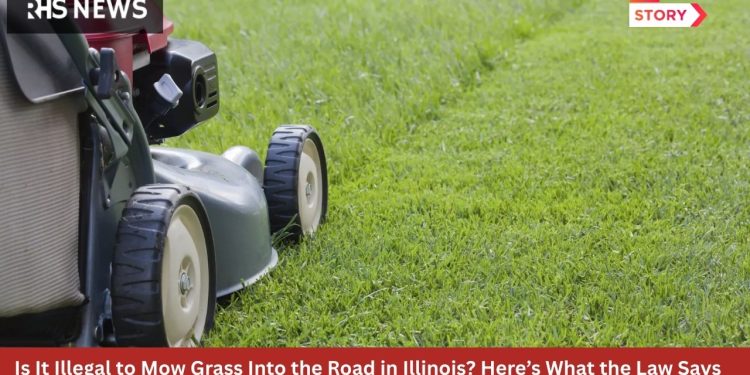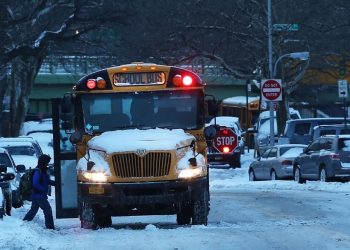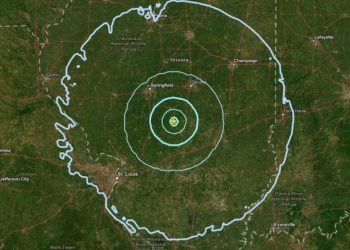Each summer, neighborhoods across Illinois buzz with the sound of lawnmowers. Maintaining a tidy lawn is often seen as a matter of community pride from Chicago’s suburban neighborhoods to the rolling fields near Peoria, Springfield, and Rockford. However, an act that seems harmless—blowing, raking, or mowing grass clippings onto city streets—can have serious legal, environmental, and safety repercussions.
So, is it illegal to leave your grass clippings on a public road in Illinois? This in-depth guide explores the laws, reasons behind them, city-specific examples, fines, and the dangers associated with grass clippings left on the road. Whether you live in the heart of Chicago or the small towns of Southern Illinois, it’s crucial to understand what the law says—and why it matters for you and your neighbors.
The Illinois State Law on Grass Clippings in the Road
Illinois maintains strict rules regarding what can be discarded onto public property, and grass clippings are no exception. Under the Illinois Vehicle Code and the Illinois Litter Control Act, it is illegal to deliberately deposit any material—including grass clippings—onto a public roadway if it poses a hazard to motorists or becomes a traffic hazard.
Specifically, the state defines “litter” to include grass clippings and landscape waste in its litter law. Dumping, blowing, or leaving grass clippings on city streets, highways, or alleys is considered an act of littering. This law doesn’t distinguish between homeowners, renters, or professional landscapers; anyone found breaking the rule is subject to penalties.
Moreover, the statute is written broadly to cover any “discarded, used or unconsumed substance or waste,” which means neither intention nor quantity matters. A small amount of grass swept onto the curb or a massive pile blown into the middle of the road are both violations.
Why Illinois Enforces This Law
The reasoning behind Illinois’ tough stance is multifaceted, touching on public safety, environmental health, and local infrastructure.
-
Road Safety: Grass clippings, especially when fresh and damp, create a slippery film on pavement. For drivers of cars, this may mean a small reduction in traction; for motorcyclists and bicyclists, the result can be devastating. In fact, there have been fatal accidents in Illinois—such as a tragic case in Bureau County—where a motorcyclist lost control after hitting grass clippings. The thin, wet coating behaves much like ice, removing a tire’s grip and turning an otherwise safe street into a hazard for two-wheel vehicles.
-
Storm Drain Blockage: When clippings enter city sewers, especially during heavy rains in cities such as Peoria or Urbana, they can clog storm drains and cause localized flooding. This affects not only road safety but can send water rushing into homes and businesses.
-
Environmental Impact: Grass clippings contain nutrients that, if washed into storm drains and subsequently rivers and lakes, can fuel algae blooms and hurt aquatic ecosystems in cities along the Illinois River, like Peoria and Pekin.
-
Community Cleanliness: Streets littered with clippings send a message of neglect and reduce curb appeal, impacting neighborhoods from Springfield’s tree-lined avenues to the busy streets of Decatur.
Penalties for Mowing Grass Into the Street
The penalties for blowing grass clippings onto the street in Illinois can be severe. The exact fine depends on the location and the circumstances, but here is what violators can expect:
-
Statewide Fines: First-time offenders may face fines starting at $50. If prosecuted as a regular littering violation, the fine can rise to $1,500. Repeat offenders can face fines up to $25,000, especially if the clippings cause an accident or injury.
-
Municipality and City Fines: Individual cities enforce additional rules and fines above the state minimums. For instance:
-
Chicago enforces strict property maintenance ordinances. While Chicago focuses more on landscape requirements and composting, the city does treat landscape waste on roadways as a code violation if not bagged for pickup.
-
Springfield issues fines up to $500 for yard waste left on city streets.
-
Lincoln’s city ordinance sets fines between $50 and $400 and empowers police to ticket offenders.
-
Dixon recently updated its city code to explicitly include grass clippings as a violation, with new fines starting at $100.
-
Peoria, Urbana, Rockford, and Aurora also maintain ordinances against depositing landscape waste or other debris into public right-of-ways, and fines in these areas are strictly enforced.
-
If city codes are violated, the city may sometimes step in and remove the clippings at the owner’s expense—often adding extra administrative fees.
What Happens If Grass Clippings Cause an Accident?
Legal consequences escalate significantly when grass clippings cause a crash. If evidence shows a property owner’s negligence led to a motorcyclist or cyclist being injured or killed, civil liability is possible. Property owners may be held responsible for damages, medical bills, or worse, if someone is seriously injured or dies as a direct result of clippings left in the road. In extreme cases, criminal charges could be considered, especially if gross negligence is shown.
City-by-City Examples in Illinois
Chicago
In Chicago, the Department of Streets and Sanitation and the Bureau of Forestry oversee street cleanliness and landscape codes. The city has enforced rules against landscape material left in the street for decades, and its composting ordinance modernizes how waste should be managed. While the city encourages composting, it expects waste to be disposed of properly—never tossed onto city streets or alleys.
Springfield
Springfield’s code explicitly outlaws depositing yard waste—grass, leaves, limbs—on any street or public space. The city routinely issues tickets, particularly as the severity of flooding and stormwater concerns grow every year.
Peoria
Peoria not only enforces mowing height for lawns but also closely monitors improper disposal of landscape waste, including grass clippings, in streets and gutters. Improperly disposed waste can trigger fines and city-ordered cleanups at the property owner’s cost.
Dixon
Dixon updated its city ordinance to make it crystal clear that blowing grass and leaves into the street is illegal. City department heads and the police now issue tickets starting at $100 for a first offense, and the code now directly empowers local enforcement.
Rockford
Rockford, the state’s third-largest city, treats blown yard waste as a code violation and encourages residents to either mulch, compost, or bag waste for collection on specific days.
Robinson and Smaller Towns
Even in smaller communities—such as Robinson—local ordinances echo state rules, forbidding the practice both for safety and stormwater management.
Why Homeowners and Landscapers Must Be Especially Careful
Homeowners and landscaping companies share equal responsibility under Illinois law. Landscapers working in suburban areas like Naperville, Champaign, or Decatur are often monitored more closely because their work is visible. Professional companies can be reported for violations, leading to fines and potential loss of municipal contracts.
If you are hiring professionals to maintain your yard, explicitly instruct them not to blow clippings into the street or gutter. As the property owner, you are usually considered responsible for the actions of contractors on your property.
Safer and Legal Ways to Dispose of Grass Clippings
To avoid fines and keep your neighbors safe, consider these alternatives:
-
Mulch or Compost: Use a mulching mower to return clippings to the lawn, which adds nutrients to the soil and keeps them off the road.
-
Bag Clippings: Most Illinois cities offer yard waste collection on a regular schedule. Use paper yard waste bags or containers marked for collection, and place them at the curb, not in the street.
-
Community Compost Sites: Chicagoland and other urban areas now maintain community compostes for larger amounts of organic waste.
-
Corner Sweep: Always finish mowing by sweeping or blowing any loose clippings back onto your property or collecting them for disposal.
Civic Engagement: Reporting and Education
Illinois communities often encourage residents to report repeat offenders, especially when stormwater management or street flooding is a concern. Many neighborhoods, particularly in urban and suburban areas, post reminders on social media and city websites with the beginning of mowing season.
In 2025, several Illinois towns began annual public campaigns to educate citizens on the environmental and safety risks of landscape waste in the road. These measures have led to improved compliance and cleaner, safer neighborhoods.
Frequently Asked Questions
Is it illegal everywhere in Illinois or just in larger cities?
The law applies statewide, but enforcement and fine amounts may vary by city and county. Local ordinances can strengthen, but not weaken, state laws.
Do small amounts of grass really cause accidents?
Yes. Even sparse or damp clippings can reduce traction. Illinois has real-world examples where motorcyclists have been seriously injured, and at least one fatal case was directly linked to grass on the road.
Can cities charge for cleaning up yard waste left in the street?
Yes. Many Illinois cities will send cleanup crews if the property owner fails to comply after an initial warning and typically charge the full cost plus administrative fees to the resident or property owner.
Are landscapers responsible, or is it just the homeowner?
Both are responsible. As a property owner, you may be legally liable for actions taken by anyone working on your behalf, including hired landscapers.
Do cities like Chicago and Peoria recycle grass clippings?
Chicago now targets composting, and many northern cities offer collection services specifically for yard waste, including grass clippings, which are turned into compost for use in public parks and gardens.
Conclusion
While mowing the lawn is a routine part of summer for nearly every Illinois resident, tossing or blowing grass clippings into public streets is far from harmless. It’s dangerous, illegal, and costly. Whether you’re in Chicago, Springfield, Peoria, Rockford, or a small rural town, keeping grass clippings and yard waste off the road protects neighbors, keeps streets safe for everyone, and avoids hefty fines.
The message for all Illinois residents is clear: Be a responsible member of your community. Dispose of your yard waste legally and safely, and help keep Illinois roads clean and hazard-free for everyone.









